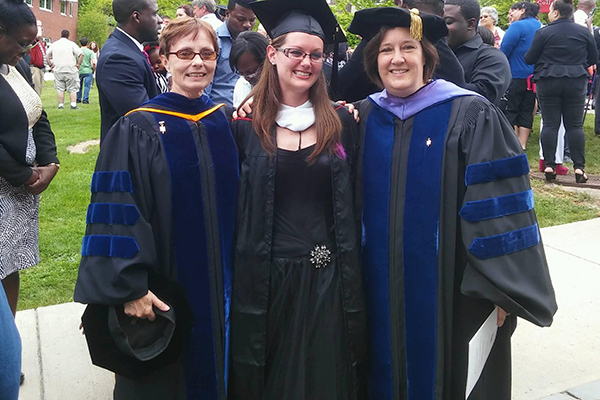
10/20/2025
SUNY Cortland students can overcome even a major hiccup on the way to earning one’s college degree, such as a change of university.
During SUNY Cortland’s Transfer and Non-Traditional Student Week from Oct. 20 to 24, when many activities are offered, students can take heart from Cortland faculty and staff members who shared their wisdom gained from finding their passion at the second or, sometimes, third college they tried.
Four university employees recently related their experiences with SUNY Cortland’s estimated 550 to 600 transfer students and approximately 200 non-traditional students:
- Yolanda Clarke, an assistant professor of health at Cortland, was looking for cultural enrichment and more campus activities when she changed horses mid-rodeo in her undergraduate career.
- Kate Graham, an instructor in the Economics Department, as an undergraduate threw herself wholeheartedly into student activities to smoothly transition to her new institution.
- Amber Pakkala, a disability service provider who is currently working as the university’s learning strategist, as a non-traditional student and disabled woman turned her challenges into a superpower. She tried the buddy system to get her to a bachelor’s degree — the buddies being her college professors.
- Cali Young ’09, the field placement coordinator at the Field Experience and School Partnerships Office with SUNY Cortland’s School of Education, immersed herself in clubs and volunteer activities.
Clarke was living in Rochester, N.Y., when she transferred from nearby tiny Nazareth College to the University of Louisiana to return to her childhood roots.
“I simply missed it and wanted to go back. I also wanted to enjoy a university setting rather than small college,” she said. “I transferred because I wanted a stronger sense of culture and enjoyment on campus. I understood college to be a place of healthy, holistic development.”
But she missed her parents back in Rochester.
“Getting involved in a couple of student orgs helped and I had a staff mentor who reminded me to stay focused.”
Clarke would advise Cortland’s latest transfer students, “Learn the culture of Cortland by getting involved in something you are passionate about and enjoy it to the fullest! Find a faculty mentor and go to class!”
Graham’s switch from Mount Holyoke College to the University of New Hampshire was made easier by her extra effort at building social connections.
“Get involved in activities and clubs on campus to meet other students,” she said. “As a transfer, it can be a bit more difficult to make friends but get yourself out there and it will happen.”
Young, as a Cortland native whose mother worked on campus, was very familiar with the college when she transferred from TC3. But SUNY Cortland’s larger campus and more populated classrooms made bonding with classmates difficult.
“I also felt like more of a non-traditional student because I lived off campus and worked a lot,” she said.
“That’s why my best advice is to volunteer or help with organizations or clubs,” Young said. “You learn to support each other in stressful times and that sticks with you.”
Pakkala, a native of Lake Travis, Texas, withdrew after several years from the state’s Temple College to train at the Finger Lakes School of Massage and work as a medical massage therapist.
She then took another run at finishing a bachelor's degree, applying to Ithaca College and Wells College.
Her return to college at that point made her a non-traditional student, which the university describes as undergraduate students who are 24 years of age or older or, regardless of age, may have dependent children, be working full-time, have military experience or have made a break in education at some point after high school.
“I tried Ithaca and ended up withdrawing from the college after a month of being there,” Pakkala said. That was after her disability accommodation cost her a prestigious scholarship.
Discouraged, she changed universities and disciplines. Pakkala arrived at the Wells College campus in Aurora, N.Y., in January without yet knowing her class placement, that is, the classmates with whom she would bond and graduate.
“Once I got into my major and had my minor declared, I found that the professors really saw me,” she said.
Prepared for a fresh start, she wrote the traditional Wells thesis but also conducted undergraduate psychology research that she presented at a conference. Upon graduation, she was now ready to help others in her situation at Cortland.
“My advice to transfer students is to take some time to learn about your professors’ research interests and areas of expertise,” Pakkala said. “When I did this at Wells College, it helped me connect more deeply with my professors and make the most of the two-and-a-half years I spent there.”
Select and image to start a slide show


